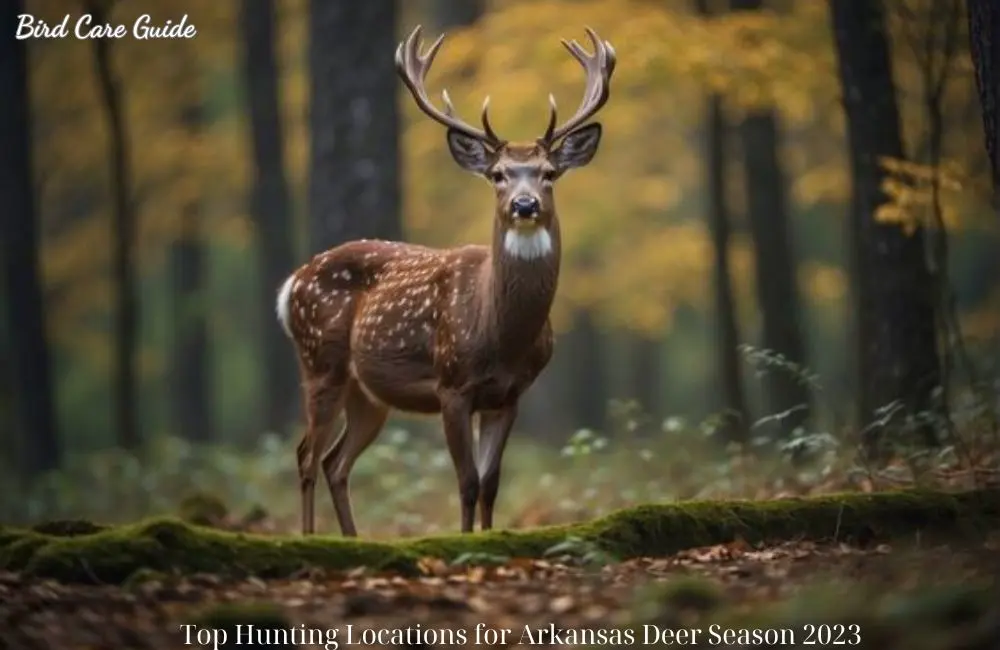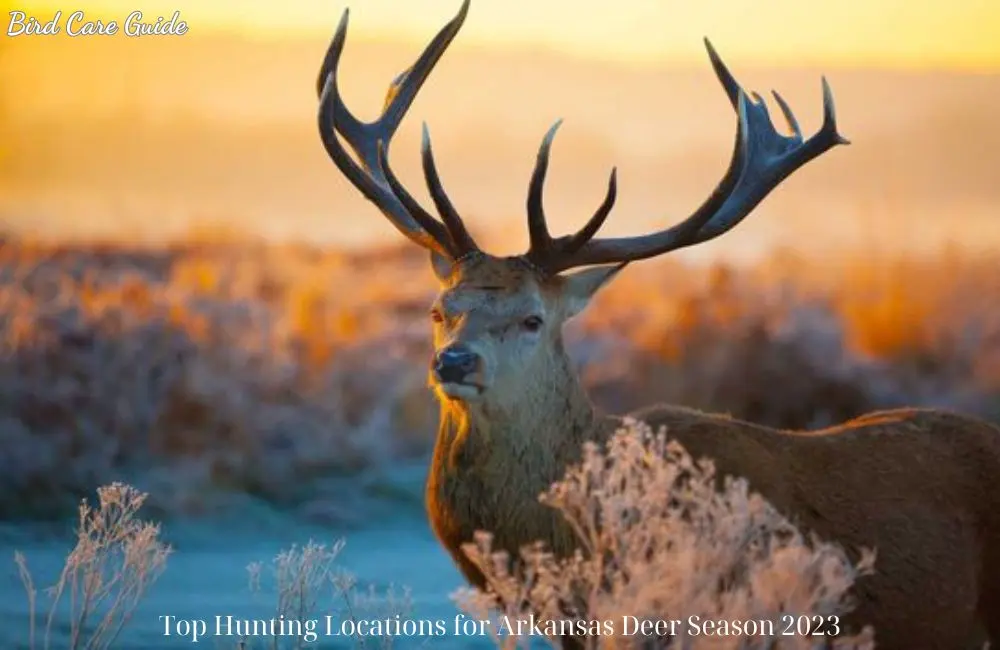As the cooler months approach, hunters in Arkansas eagerly anticipate the start of the Arkansas deer season 2023. With the state’s rich and diverse habitats, deer hunting in Arkansas offers an exceptional experience for both novice and experienced hunters. This article, “Bird Care Guide” will explores the top hunting locations for Arkansas deer season 2023, providing insights into the best spots, tips for successful hunts, and important regulations to ensure a fruitful and safe hunting season.
Overview of Arkansas Deer Season 2023
Key Dates and Regulations
The Arkansas deer season 2023 is divided into several segments, each with specific dates and regulations:
- Archery Season: Begins in late September and runs through the end of February.
- Muzzleloader Season: Typically starts in mid-October and lasts for about two weeks, with a late season in December.
- Modern Gun Season: Usually begins in mid-November and runs through early December, with an additional late season in January.
Bag Limits and Licensing
For the 2023 season, the Arkansas Game and Fish Commission (AGFC) has established the following bag limits:
- Zone Bag Limit: Up to six deer, with no more than two bucks.
- Doe Days: Specific days are designated for harvesting does, varying by zone.
Hunters must possess a valid Arkansas hunting license and deer permit. Additional permits may be required for certain areas, such as wildlife management areas (WMAs).
Top Hunting Locations in Arkansas

Arkansas is home to a variety of habitats, from dense forests to sprawling fields, providing excellent hunting opportunities across the state. Here are some of the top hunting locations for Arkansas deer season 2023:
1. Ozark National Forest
Located in northern Arkansas, the Ozark National Forest spans over a million acres and offers a diverse range of terrains, from rugged mountains to serene valleys. The forest is well-known for its healthy deer population, making it a prime destination for deer hunters.
Hunting Tips:
- Scout Early: Familiarize yourself with the area before the season starts. Look for signs of deer activity, such as tracks and droppings.
- Use Tree Stands: The dense forest cover provides excellent opportunities for using tree stands. Position your stand near feeding areas or travel corridors.
- Stay Mobile: Be prepared to move if deer activity shifts. Flexibility can increase your chances of success.
2. White River National Wildlife Refuge
The White River National Wildlife Refuge, located in eastern Arkansas, covers nearly 160,000 acres and is one of the largest wildlife refuges in the United States. The refuge is renowned for its bottomland hardwood forests and abundant wildlife, including a significant deer population.
Hunting Tips:
- Water Access: Many areas of the refuge are best accessed by boat. Use a boat to reach secluded hunting spots.
- Flooding Awareness: Be aware of water levels, as the refuge is prone to flooding. Adjust your hunting strategy based on water conditions.
- Hunt Edges: Focus on the edges of flooded timber and hardwood forests where deer are likely to travel.
3. Bayou Meto Wildlife Management Area
Located in southeastern Arkansas, the Bayou Meto Wildlife Management Area is famous for its waterfowl hunting, but it also offers excellent deer hunting opportunities. The area features a mix of wetlands, hardwood forests, and agricultural fields.
Hunting Tips:
- Utilize Duck Blinds: During deer season, unused duck blinds can provide excellent cover for deer hunting.
- Agricultural Fields: Deer often feed in the agricultural fields surrounding the wetlands. Set up near these fields for better chances of spotting deer.
- Check Regulations: The area has specific hunting regulations, so ensure you are familiar with them before hunting.
4. Winona Wildlife Management Area
Situated in central Arkansas, the Winona Wildlife Management Area encompasses over 160,000 acres of prime deer habitat. The area features a mix of pine and hardwood forests, as well as clear-cut areas that provide excellent forage for deer.
Hunting Tips:
- Clear-Cut Areas: Focus on the clear-cut areas where new growth attracts deer looking for food.
- Trail Cameras: Use trail cameras to monitor deer activity and plan your hunts accordingly.
- Early and Late Season: The early and late parts of the season can be particularly productive as deer patterns change with the availability of food and cover.
5. St. Francis National Forest
The St. Francis National Forest, located in eastern Arkansas along the Mississippi River, offers diverse hunting opportunities across its 22,600 acres. The forest is characterized by bottomland hardwoods and upland ridges, providing a varied landscape for deer hunting.
Hunting Tips:
- Bottomland Hardwoods: Focus on the bottomland hardwood areas where deer are likely to find food and cover.
- River Access: Utilize river access to reach more remote and less pressured areas of the forest.
- Ridge Lines: Hunt along ridge lines where deer travel between feeding and bedding areas.
6. Felsenthal National Wildlife Refuge
The Felsenthal National Wildlife Refuge in southern Arkansas is known for its extensive wetlands and bottomland hardwood forests. Covering over 65,000 acres, the refuge provides excellent habitat for deer and other wildlife.
Hunting Tips:
- Wetland Edges: Focus on the edges of wetlands where deer are likely to feed and travel.
- Portable Stands: Use portable stands to stay mobile and adapt to changing deer patterns.
- Check Water Levels: Water levels can vary, so be prepared to adjust your hunting strategy based on current conditions.
Essential Gear for Arkansas Deer Season 2023
To maximize your success during the Arkansas deer season 2023, ensure you have the right gear:
1. Firearms and Archery Equipment
- Modern Guns: Choose a reliable rifle with appropriate caliber for deer hunting. Ensure your firearm is sighted in and well-maintained.
- Muzzleloaders: For muzzleloader season, use a high-quality muzzleloader and practice loading and firing.
- Archery Equipment: If hunting during archery season, use a well-tuned bow and practice your shooting skills regularly.
2. Clothing and Footwear
- Camouflage: Wear camouflage clothing that matches the environment you are hunting in. Consider scent-blocking clothing to reduce your scent profile.
- Boots: Invest in waterproof, insulated boots for comfort and protection against the elements.
- Layering: Dress in layers to stay warm and comfortable throughout the day.
3. Hunting Accessories
- Tree Stands and Blinds: Use tree stands or ground blinds to conceal yourself and get a better vantage point.
- Trail Cameras: Set up trail cameras to monitor deer activity and plan your hunts accordingly.
- Calls and Decoys: Use deer calls and decoys to attract deer to your hunting area.
4. Safety Gear
- Harnesses: If using a tree stand, always wear a safety harness to prevent falls.
- First Aid Kit: Carry a first aid kit for emergencies.
- Communication Devices: Use a cell phone or two-way radio to stay in contact with other hunters or emergency services.
Tips for a Successful Hunt
To make the most of the Arkansas deer season 2023, consider these tips:
1. Scout Early and Often
Pre-season scouting is crucial for identifying deer patterns and locating prime hunting spots. Look for signs such as tracks, droppings, and bedding areas. Use trail cameras to monitor deer activity and adjust your hunting strategy based on the data.
2. Hunt During Peak Activity Times
Deer are most active during the early morning and late afternoon. Plan your hunts around these peak activity times to increase your chances of success. Additionally, hunting during the rut (mating season) can be particularly productive as deer are more active and less cautious.
3. Be Patient and Persistent
Successful deer hunting requires patience and persistence. Spend time in your hunting area, remain still and quiet, and be prepared to wait for the right opportunity. Avoid the temptation to move frequently, as this can alert deer to your presence.
4. Use the Wind to Your Advantage
Deer have a keen sense of smell, so always hunt with the wind in your favor. Position yourself downwind of the area you expect deer to approach from, and use scent-blocking products to minimize your scent.
5. Stay Mobile and Adaptable
Be willing to adjust your hunting strategy based on changing conditions and deer activity. If a particular spot is not productive, be prepared to move to a different location. Portable stands and ground blinds can help you stay mobile and adaptable.





